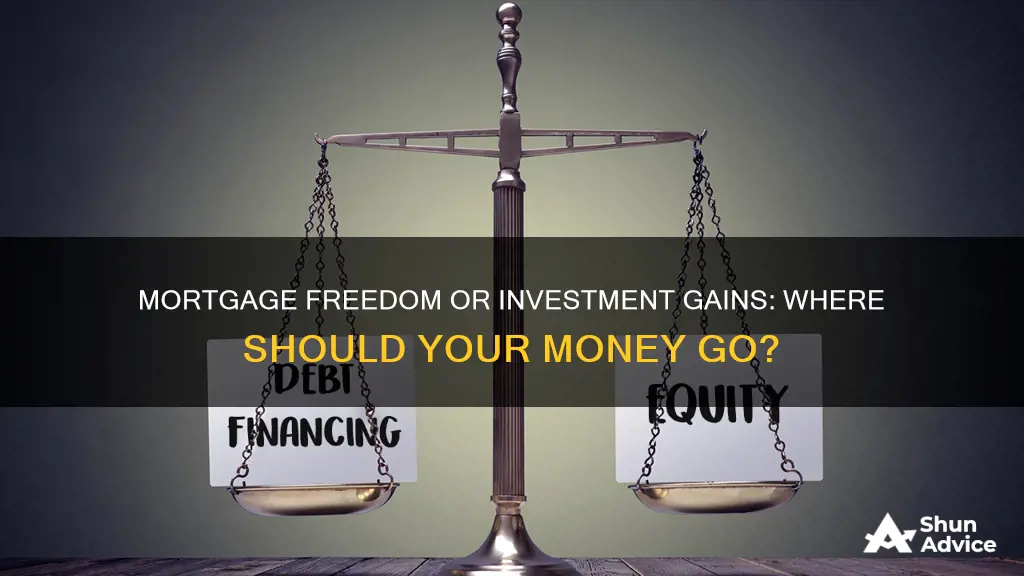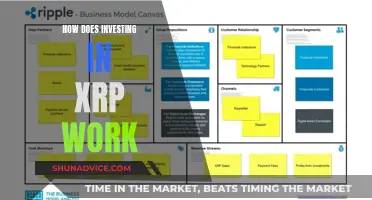
Paying off your mortgage early or investing extra money elsewhere is a complex decision that depends on your financial situation, risk tolerance, and long-term goals. Here's an introduction to the topic, weighing the pros and cons of each option.
Paying off your mortgage early can provide peace of mind and reduce financial stress. It eliminates your monthly mortgage payments, potentially saving you thousands of dollars in interest over the life of the loan. This option also offers a predictable rate of return and allows you to build equity in your home more quickly, which can be beneficial if you plan to refinance or take out a home equity loan.
On the other hand, investing your extra money can potentially generate higher returns, especially if you invest in the stock market, which has historically outperformed the average mortgage rate. Investing provides liquidity, allowing you to access your funds more easily compared to tying up your wealth in real estate. Additionally, investing in a retirement account can offer tax advantages and employer matching contributions.
However, investing carries a higher risk due to market volatility, and there is no guarantee of returns. Paying off your mortgage early may be a safer option, but it could result in an opportunity cost if you miss out on potential higher returns from investments.
Ultimately, the decision depends on your personal circumstances and financial goals. It's essential to consider factors such as your risk tolerance, interest rates, tax implications, and the potential for higher returns from investments. Consulting a financial advisor or certified financial planner can help you make an informed decision that aligns with your goals and risk appetite.
| Characteristics | Values |
|---|---|
| Opportunity cost | The opportunity cost of paying off a mortgage early is foregoing the potential for higher returns from other investments. |
| Interest rates | The interest rate on a mortgage loan can vary depending on economic conditions and the borrower's creditworthiness. |
| Investment returns | The stock market has historically provided higher returns than mortgage rates, but there is a risk of losses. |
| Peace of mind | Paying off a mortgage early can provide peace of mind and reduce financial stress. |
| Tax deductions | Mortgage interest is tax-deductible for many homeowners, which can reduce the amount owed to the government. |
| Risk tolerance | Paying off a mortgage early is a risk-free investment, while investing in the stock market carries the risk of losing money. |
| Financial goals | Paying off a mortgage early may not align with an individual's financial goals, such as saving for retirement or investing in other assets. |
| Liquidity | Paying off a mortgage early can reduce liquidity by tying up a significant portion of an individual's wealth in their home. |
What You'll Learn
- Paying off your mortgage early frees up cash flow and saves you money on interest
- Investing your extra cash instead of paying off your mortgage early has historically yielded higher returns
- Paying off your mortgage early reduces income uncertainty
- Paying off your mortgage early reduces interest
- Paying off your mortgage early forces you to save

Paying off your mortgage early frees up cash flow and saves you money on interest
Paying off your mortgage early can have a positive impact on your cash flow and save you money on interest.
Firstly, eliminating your monthly mortgage payment frees up extra funds that can be used for other financial goals. For example, you could increase your retirement savings by making higher contributions, build an emergency fund, or pay off high-interest credit card debt.
Secondly, paying off your mortgage early can result in significant interest savings. The interest saved is a guaranteed return on your investment, which can amount to thousands or even tens of thousands of dollars over the life of the loan.
However, it is important to consider the opportunity cost of paying off your mortgage early. By investing your extra funds instead, you could potentially earn higher returns in the stock market or through other investments. Additionally, paying off your mortgage early may result in the loss of certain tax benefits, such as the mortgage interest deduction, which could impact your overall financial situation.
Ultimately, the decision to pay off your mortgage early or invest depends on various factors, including your financial goals, risk tolerance, and the current interest rate environment. It may be beneficial to consult a financial advisor or certified financial planner to determine the best course of action for your specific situation.
PewDiePie vs T-Series: Why the Obsession?
You may want to see also

Investing your extra cash instead of paying off your mortgage early has historically yielded higher returns
The stock market has historically yielded higher returns than paying off your mortgage early.
For example, say you have a 30-year mortgage of $200,000 with a fixed rate of 4.5%. Your monthly payments would be $1,013 (not including taxes and insurance), and you’d spend a total of $164,813 in interest over the life of the loan. Now, let’s say that you’re able to come up with an extra $300 per month to put toward your mortgage. You’d save $67,816 in interest.
On the other hand, you could take that $300 per month and invest it in an index fund that tracks the S&P 500 Index. Historically, the S&P 500 has returned an average of 10% to 11% annually since its inception in 1926 through 2018. If you want to be extra conservative, however, we can assume an average annual return of 8% on your investment. At the end of 19 years (about the length of time it would take to pay your mortgage early), you would have $160,780. That’s more than double your potential interest savings. In fact, after that length of time, you’d have about $105,487 left on your mortgage. If you decided to pay your mortgage early after all, you could use your investment funds and still have $55,293 left over.
Another example: assume you bought a house for $250,000. You borrow $200,000 using a 30-year mortgage loan with a fixed interest rate of 3.25%. Your mortgage loan payment is $870 per month (not including taxes and insurance), and you’d pay $113,350 in interest over 30 years. But if you make additional $2,000 payments every month, you’d pay off your mortgage in 6½ years and will only pay $21,900 in interest over that time. Your total interest savings would be $91,400.
However, this example assumes you stay in the house for your complete loan term and pay the loan off in full — which most homeowners don’t do. So let’s see how the returns compare if you invest the $2,000 each month instead of paying extra on your mortgage. History shows that other investments can yield a better annual return than the interest rate you are likely paying on your mortgage. The historical rate of return on the stock market is around 8%. So, if you choose to invest that $2,000 every month for 6½ years with an assumed 8% annual rate of return, you’d earn $203,700 – which is about $112,300 more than the $91,400 you’d save by prepaying your mortgage.
For many years now, interest rates on mortgages have stayed well below the average returns of the stock market. That means you’d likely earn a better return by investing than you’d save by paying off mortgage interest early.
Dreaming of Wall Street
You may want to see also

Paying off your mortgage early reduces income uncertainty
Paying off your mortgage early can reduce income uncertainty and provide peace of mind. If you lose your job or are forced to take a pay cut, you no longer have to worry about making mortgage payments and potentially losing your home. This is especially beneficial if you are nearing retirement and will be living on a fixed income.
However, it is important to consider the potential downsides of paying off your mortgage early. Paying off your mortgage early ties up a significant chunk of your liquidity and net worth in your home, making it harder to access cash in the event of an emergency. It also means missing out on potential higher returns from other investments, such as stocks, bonds, and mutual funds.
- Emergency fund: If you pay off your mortgage early, ensure you have an emergency fund or other liquid assets, such as stocks or mutual funds, to cover unexpected expenses or financial shocks.
- Investment opportunities: Compare the potential returns of investing in the stock market or other vehicles with the interest you would save by paying off your mortgage early. Historically, the S&P 500 has returned an average of 10%-11% annually since its inception, which is higher than most mortgage interest rates.
- Peace of mind: Weigh the psychological benefits of being debt-free and reducing financial stress against the potential financial gains of investing.
- Diversification: Consider diversifying your investments by holding multiple types of assets, such as stocks, bonds, and real estate. This can help reduce the impact of market volatility and provide a more stable portfolio.
- Tax implications: Consult a tax advisor to understand the tax implications of paying off your mortgage early, as it may affect your deductions and increase your tax burden.
In conclusion, while paying off your mortgage early can reduce income uncertainty and provide peace of mind, it is important to carefully consider the potential downsides and ensure you have sufficient liquid assets and investment opportunities to maintain your financial stability.
Sports Fandom: Why the Obsession?
You may want to see also

Paying off your mortgage early reduces interest
Paying off your mortgage early can save you thousands of dollars in interest over the life of the loan. The longer you hold the mortgage, the more interest you will pay.
For example, let's say you have a 30-year mortgage of $200,000 with a fixed rate of 4.5%. Your monthly payments would be $1,013 (not including taxes and insurance), and you'd spend a total of $164,813 in interest over the life of the loan. If you're able to put an extra $300 per month toward your mortgage, you'd save $67,816 in interest.
The interest savings can be even more significant if you pay off your mortgage early. For example, if you have a 30-year mortgage with a starting balance of $200,000 and a fixed interest rate of 3.5%, you'd pay a total of $123,312 in interest over the life of the loan. If you paid off the loan 10 years early, you'd save $20,270 in interest.
By paying off your mortgage early, you can also reduce your financial burden and stress. It can be a weight off your shoulders to no longer have a monthly mortgage payment hanging over your head. Additionally, if you experience a financial emergency, having a home that's already paid off means you don't have to worry about missing mortgage payments and potentially losing your home to foreclosure.
However, it's important to consider the opportunity cost of paying off your mortgage early. That money could potentially earn a higher return if invested elsewhere. For example, the S&P 500 has historically returned an average of 10% to 11% annually since its inception in 1926. By investing your money instead of paying off your mortgage early, you may be able to earn a higher return and build wealth faster.
Ultimately, the decision to pay off your mortgage early depends on your financial situation, risk tolerance, and personal preferences. Consult a financial advisor to help you weigh the pros and cons and make the best decision for your circumstances.
Investing Strategies During Economic Downturn
You may want to see also

Paying off your mortgage early forces you to save
Paying off your mortgage early can be a great way to save money on interest and build equity in your home. However, doing so forces you to save in a way that may not be optimal for your financial goals. Here are some key points to consider:
Forced Savings
Paying down your mortgage ahead of schedule can be an effective way to save money, as it reduces the total amount of interest you pay over the life of the loan. By making additional principal payments, you can reduce the amount of money you pay interest on before it accrues, knocking years off your mortgage term and saving you thousands of dollars. This forced savings approach ensures that you set aside a significant amount of money, which can be beneficial if you struggle with maintaining savings discipline.
Opportunity Cost
However, it's important to consider the opportunity cost of paying off your mortgage early. The money you put towards extra mortgage payments could potentially be invested elsewhere to earn a higher return. For example, investing in an index fund or the stock market could provide higher returns over time compared to the interest saved by paying off your mortgage early. By tying up your wealth in your home, you may miss out on these investment opportunities.
Liquidity
Paying off your mortgage early reduces your liquidity, as your home is a non-liquid asset. If you need cash quickly during an emergency or to seize an investment opportunity, it can take months or longer to sell your property and access the capital. This lack of liquidity can be problematic if you don't have other sources of cash or investments that are easily converted into cash.
Peace of Mind
One of the strongest arguments for paying off your mortgage early is the peace of mind it can provide. Owning your home outright eliminates the stress of a monthly mortgage payment and gives you a sense of financial security, especially as you approach retirement. This psychological benefit may outweigh the potential financial gains of investing elsewhere for some individuals.
In conclusion, while paying off your mortgage early forces you to save, it's important to consider the opportunity cost, liquidity constraints, and the value you place on peace of mind. Carefully weigh your financial goals and personal preferences before making a decision.
Cramer's Investing Club: Strategies and Secrets
You may want to see also
Frequently asked questions
Paying off your mortgage early can save you thousands of dollars in interest payments and give you peace of mind by reducing your debt. It can also help you build equity in your home more quickly, which can be useful if you want to refinance or take out a home equity loan.
Paying off your mortgage early means that your wealth is tied up in your home, which is an illiquid asset. This means that if you need money in an emergency, it will be harder to access cash. You may also miss out on higher returns from other investments and lose out on tax breaks associated with mortgage interest payments.
Investing your money rather than paying off your mortgage early may offer higher returns, especially if you invest in the stock market. Investing also gives you more liquidity, as it is easier to sell stocks, bonds and other market investments and access your money if you need to.







